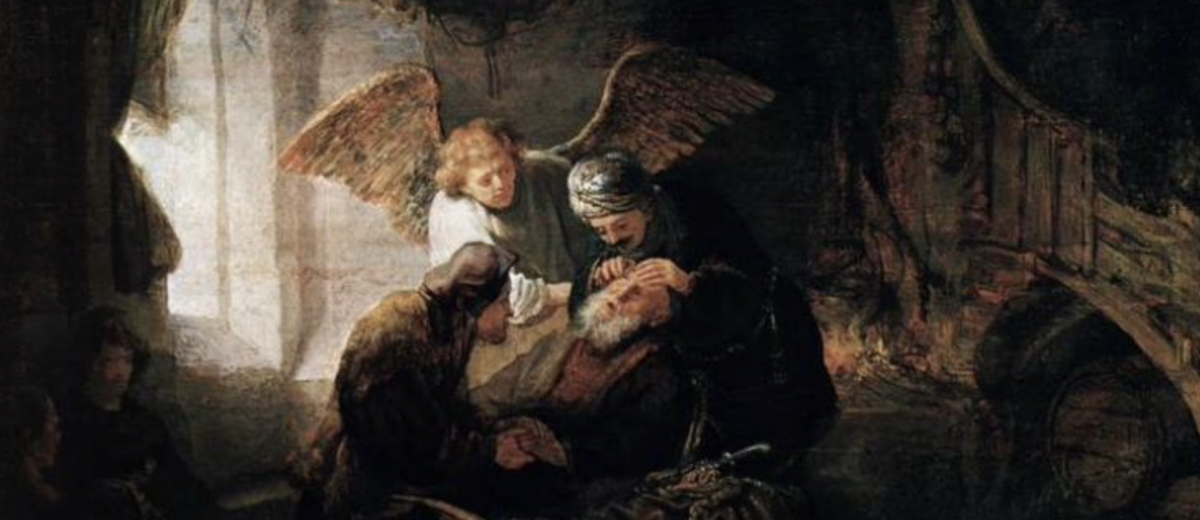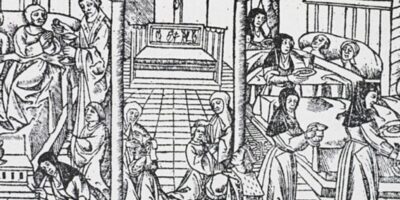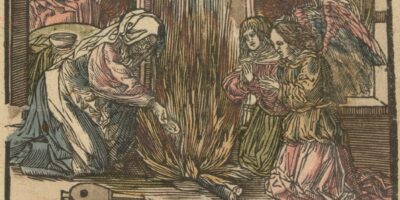When global developments or personal difficulties cloud our perspectives, it helps to step back and reflect on our wondrous existence and God’s sustaining grace.
We can easily lose sight of how much we are surrounded by wonders and improbabilites, and of how we are being constantly upheld by God’s sustaining grace. The beauty of flowers, the unfathomable starry sky, our bodies’ capacity for recovery from surgery, the birth of a child and the impact on our spirit of a beautiful landscape are examples of how we can be reassured of God’s goodness, his presence and loving purposes.
This week I have been reflecting on the Rembrandt painting (above), Tobias healing his blind father, conscious of several friends and relatives undergoing medical procedures. On the one hand, we can be grateful to God that we live in a time and age of medical understanding which gives hope for so many previously incurable conditions. On the other, we also rely on God’s presence and enabling in the operating room, as Rembrandt depicts by the angel watching over Tobias applying a curative ointment to his father Tobit’s blind eyes, from the apocryphal story of Tobit. For anyone undergoing life-saving medical intervention – which could be any one of us at anytime – this is a comforting image.
Last week I wrote about the midnight procession of some seven thousand Catholics through the inner city of Amsterdam to commemorate the God of miracles. It’s easy to be sceptical about whether or not the particular miracle being remembered on March 15 each year really happened in 1345. What is not in doubt is the impact of the belief in this miracle on the newly declared pilgrim city.
Uncertainty and humility
At the Geloof in Mokum event I featured last week, television presentator and pastor Jurjen ten Brinke raised the question if modern people could believe in miracles. Looking back from after the Enlightenment phase, when anything ‘unreasonable’ was rejected by philosophers like Spinoza and Hume, we moderns have difficulty believing the extraordinary.
Science however has moved on since the mechanical universe of Isaac Newton. Quantum mechanics, for one thing, has revealed vast areas of unexplored reality and unexplained phenomena, and introduced more uncertainty and greater humility into the scientific world.
Jurjen then told of his own ‘miraculous’ birth. ‘The fact that I am standing here is a miracle’, he explained. ‘My mother had meningitis during pregnancy, was advised to have an abortion in order to choose for her own life. She did not do that. The pregnancy progressed and it became clear that she would have a child with an open spine. A lot of prayers were said for her, my father and me. In churches and by friends and family. Three surgeons were standing by at the delivery, ready to operate on me immediately. But I was healthy. And to this day, it has never been medically clarified how this could have happened.’
Extraordinary
Jurjen related the sceptical response he still gets from telling that story, that divine intervention is incompatible with enlightened ideas about God and the world. Yet, he noted, secularisation has also produced all kinds of belief in miracles. As a pastor in Amsterdam-Noord, he has led many funerals where people said they did not believe in God, but ‘the robin from yesterday afternoon’ or ‘the butterfly from just now’ were indeed signs ‘that grandma is here’. So how rationally do we live our lives really?
Quoting a dictionary definition of ‘miracle’ as something ‘extraordinary’, Jurjen explained that Judaism saw the miracle exactly the other way around. A miracle was proof of ‘how it should be’. If a sick person was miraculously healed, this meant that evil, or sin, or that which destroyed creation, did not have the last word and that God restored something to how it was meant to be; not so much something extraordinary, but ‘back to normal’. Illness and all other subjects for which you need a ‘miracle’ are extraordinary, abnormal.
In reality, our whole existence is totally extraordinary and should inspire a constant attitude of awe and wonder. Each of us is a freak. Think of all our foreparents. If any of them had chosen a different partner we would never have existed. Assuming four generations per century, each of us would have had more than a trillion ancestors over the past millennium (2 to the power of 40)! Figure that out! Actually that is more than all the people who have ever lived so it is considerably lower than that with overlapping families. Still the probability of any of us ever coming into existence is virtually nil – yet we do exist!
English poet and priest John Donne once said: ‘The ordinary things in nature are greater wonders than the extraordinary.’ We need to ponder more the wonder of the ordinary.
Till next week,



